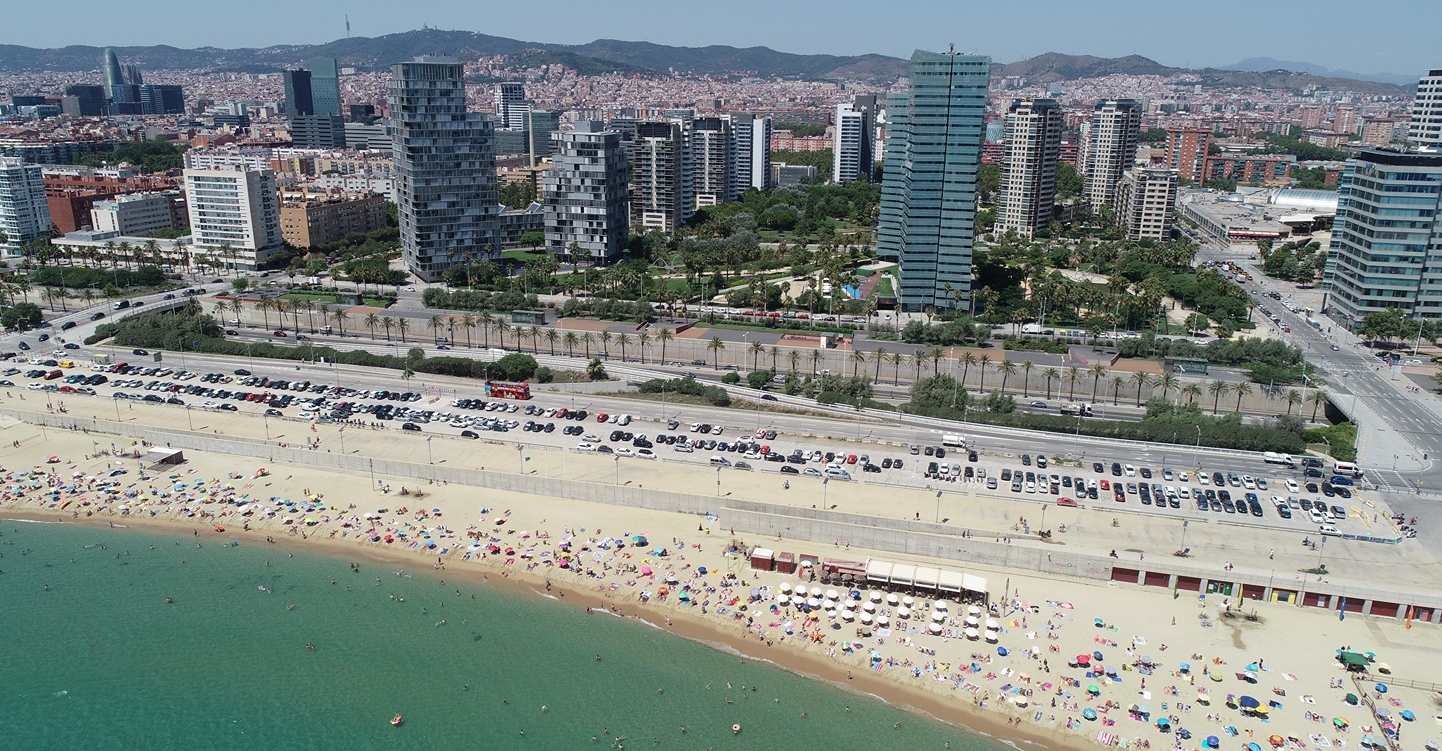
Actions to improve the environmental quality of the coastline
The coastline is the final destination of all the water flows from the water catchment area and the city’s sewage system and, therefore, its environmental quality is compromised by the quality of the water flows that empty along it. As a result, different effects on the environmental quality of the coastline have been detected.
Firstly, the water quality is affected by the overflows of the network of collectors that occur sporadically during heavy rainfall events, which involve the direct discharge of waste water diluted with rainwater into the sea. These discharges, which are controlled and monitored from the BCASA (Barcelona Cicle de l’Aigua) control centre, are managed with an alert protocol that allows preventive measures to be taken to minimise the effects on beach users. Despite the good monitoring that is carried out of the discharges, it is necessary to continue working to minimise the pollution of seawater at source, and for this reason it is necessary to build the planned anti-CSOs , as well as to build sustainable urban drainage systems (SUDS) that reduce the amount of rainwater that enters the sewage system. Furthermore, there are the odours generated in the sewage network, which spread through the sewage overflow network and emerge at the outlets.
On the Besòs coastline there is a high concentration of infrastructures that are a focus of air pollutants and odours: energy, waste, sanitation and mobility infrastructures. The Besòs is an area that has historically been industrial and has existed next to the city and the sea, and although there have been recent urban transformations that have substantially improved the environmental quality of the surroundings, it continues to be an environment with pollution problems affecting the air, the soil and the seabed. Recently, several citizen platforms have been formed to demand an improvement to the air quality in this area.
Actions related to sanitation and the impact of infrastructures in the Besòs coastline are the most important in terms of improving the environmental quality of the coast. But there are other areas where action is also needed, such as waste management or aspects that determine the comfort and health of the user (noise, odours and air quality). Several of these issues are already included in other projects of the Coastal Plan.
Actions:
- Construction of the anti-CSOs planned and pending construction.
- Installation of the SUDS planned in the Barcelona Alternative Water Resources Plan.
- Prova pilot de nous sistemes per a la reducció de l’impacte de les aigües no tractades durant episodis de tempesta en la qualitat de l’aigua de bany (en el marc del projecte europeu iBathwater).
- Pilot test of new systems to reduce the impact of untreated water during storm events on the quality of bathing water (within the framework of the European iBathwater project).
- Creation of a permanent round table for the technical monitoring of air quality in the Besòs area with all the institutions involved and the participation of the citizens.
- Specify the improvements to be made to reduce the emissions of the dioxin-emitting focal points in the Besòs area.
- Actions to solve odour problems: improvement of the WWTP (Waste Water Treatment Plant) in terms of odours and analysis of the feasibility of a change of technology in the sewage sludge treatment plant.
- Continue with the air quality studies already carried out: study of the effects of dioxins on health and monitoring over a period of one year of dioxin emissions from the different emission points in order to know the contribution.
- Establishment of an open, publicly accessible information system on the quality of coastal water and air.
- Monitoring of citizens’ complaints about environmental quality deficits on the coast.
What are we doing?
Different actions have been carried out to improve environmental quality, mainly with regard to water and air, and also with regard to soil. Some of them are not only coastal actions, but also city actions. Of particular note are:
-
The Technical Plan for the Use of Alternative Water Resources in Barcelona, PLARHAB 2020.
-
Participation in the European iBathwater project, a pilot test of new systems to reduce the impact of untreated water during storm events on the quality of bathing water.
-
Activation of the Barcelona Low Emission Zone (LEZ) on the ring roads by 2020.
-
Evaluation of the quality of the subsoil on Barcelona’s Llevant beach 2022.
-
Final approval of the Prim rainwater tank, 2025. The tank is one of the three priorities and largest projects of Barcelona Master Plan for Comprehensive Sanitation (PDISBA).



